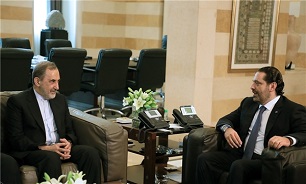Source Reveals Contents of Velayati, Hariri's Talks
 "The resigned Lebanese prime minister who had traveled
to Saudi Arabia before this meeting (with Velayati) returned to Beirut for this
meeting and then immediately left for Riyadh again after hearing Tehran's
positions and declared his resignation there via the Arab media," the
informed source close to Velayati said on Sunday.
"The resigned Lebanese prime minister who had traveled
to Saudi Arabia before this meeting (with Velayati) returned to Beirut for this
meeting and then immediately left for Riyadh again after hearing Tehran's
positions and declared his resignation there via the Arab media," the
informed source close to Velayati said on Sunday.
"During the meeting, Hariri raised the Saudis' demands before Velayati, calling on Iran to stop supporting the oppressed Yemeni people and improve ties with the Persian Gulf Cooperation Council (PGCC)," the source added.
In response, the source said, Velayati called on the Saudis to stop bombing the innocent Yemeni people and remove the siege on them to pave the way for political talks.
"The improper demand of Hariri and the Saudis was that the Islamic Republic of Iran leaves the righteous side in the Yemen case but when they became disappointed, they immediately recalled Saad Hariri to Riyadh so that he will declare his resignation outside Lebanon," the source said.
In relevant remarks on Saturday, Senior Advisor to the Iranian foreign minister Hossein Sheikholeslam underlined that Trump and Saudi Crown Prince Mohammad Bin Salman have coaxed al-Hariri into declaring his resignation in a foreign country.
"Al-Hariri's resignation was done in coordination with Trump and Mohammed bin Salman to foment tension in Lebanon and the region," Sheikholeslam said.
Noting that the resignation was planned by the Americans to make up for their losses after the ISIL was defeated in the region, he said it was better for al-Hariri to respect the Lebanese nation and submit his resignation inside the country and not from a foreign state, Saudi Arabia.
Al-Hariri resigned during a trip to Saudi Arabia in a surprise move that plunged the country into uncertainty amid heightened regional tensions.
In a televised address from Riyadh, al-Hariri launched a vicious tirade against Iran and the Lebanese Hezbollah group for what he claimed was their meddling in Arab affairs.
Al-Hariri was appointed prime minister in late 2016 and headed a 30-member national unity cabinet.
Al-Hariri’s resignation on Saturday was expected to sharply raise tensions in the country.
In his speech, he claimed he feared for his life and that the atmosphere in the country is similar to the one that existed before his father, the late prime minister Rafik al-Hariri, was assassinated in 2005.
